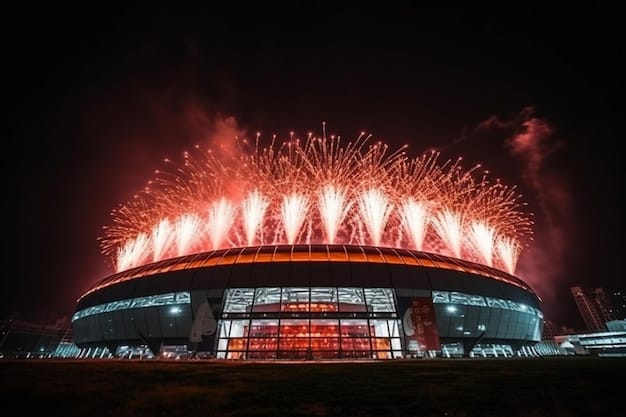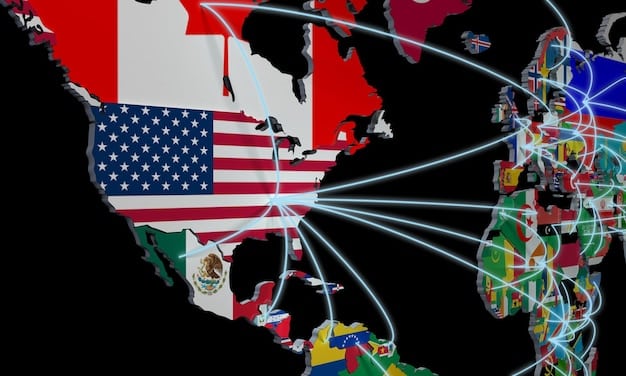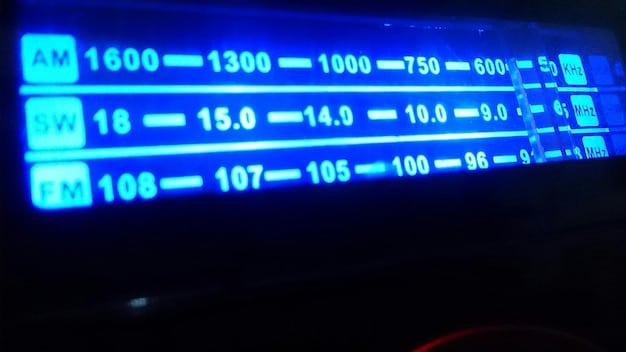World Cup 2026 Ticket Price Guide & How to Secure Seats

Navigating the World Cup 2026 ticket landscape requires strategic planning and budgeting to secure your desired seats, considering various price tiers, official sales channels, and the high demand for this global sporting spectacle. Understanding the evolving ticketing system is crucial for a successful purchase.
Planning to experience the thrill of the FIFA World Cup 2026 live? Understanding the World Cup 2026 Ticket Price Guide: How to Budget and Secure Your Seats is paramount for any aspiring fan looking to witness history unfold. This guide is crafted to equip you with the essential knowledge needed to navigate the complex world of World Cup ticketing, ensuring you can budget effectively and increase your chances of securing those coveted spots.
Understanding the World Cup 2026 Ticketing Landscape
The FIFA World Cup 2026, jointly hosted by the United States, Canada, and Mexico, promises to be an unprecedented event with its expanded format. This trifecta of host nations adds layers of complexity and opportunity to the ticketing process. Unlike previous tournaments, the sheer number of matches and venues means a broader distribution of tickets, but also increased demand from a larger geographic fan base.
Historically, FIFA ticket sales operate in several distinct phases, each with its own nuances and requirements. The first phase often involves a lottery system, where fans register their interest for specific matches or ranges of matches without upfront payment. Subsequent phases typically include first-come, first-served sales for remaining tickets, which are notoriously competitive. Understanding these phases and preparing for them well in advance is the first step toward securing your spot.
Phases of Ticket Sales: What to Expect
While the official dates for the World Cup 2026 ticket sales have not been announced, we can draw valuable insights from past tournaments. Typically, FIFA structures its sales into three main phases, designed to manage demand and ensure fair distribution. Preparing for each phase is crucial.
- Phase 1: Lottery Application. This early phase allows fans to apply for tickets to specific matches or team-specific packages. It’s a lottery, meaning entry doesn’t guarantee a ticket, but it’s often the best chance to get highly sought-after matches at face value. Successful applicants are then notified and charged.
- Phase 2: First-Come, First-Served (FCFS). Following the lottery, any remaining tickets are usually made available on a FCFS basis. This phase requires quick action and a reliable internet connection, as tickets can sell out in minutes.
- Phase 3: Last-Minute Sales. Closer to the tournament, FIFA may open a final sales window for any returns or last-minute allocations. While rare, this can be an opportunity for those who missed out.
Knowing these phases helps fans strategically plan their attempts. It’s not just about when to buy, but how to optimize your chances during each window. Registering for FIFA’s official ticketing alerts is critical for staying informed about exact dates and procedures.
The integrated approach of three host nations will likely influence ticket distribution, with some allocation potentially reserved for residents of each host country. Being aware of these potential geographic limitations or priorities in certain sales windows could prove advantageous. The scale of the tournament means that flexibility in match choices, especially for less prominent games, might increase your chances of getting tickets.
To successfully navigate these phases, it’s essential to have your FIFA account ready and your payment information pre-registered. Any delay can mean the difference between securing a seat and missing out. Staying updated through official FIFA channels and reliable sports news outlets will be key to real-time information.
Estimating World Cup 2026 Ticket Prices
Predicting the exact ticket prices for World Cup 2026 involves a degree of educated guesswork, as official figures are yet to be released. However, by analyzing historical data from past tournaments, especially those held in developed countries like the USA ’94 or the more recent Qatar 2022, we can establish a reasonable pricing framework. Factors such as the economic climate, host nation’s cost of living, and the prestige of the match will all play a significant role.
Historically, FIFA categorizes tickets into different price tiers, usually Cat 1, Cat 2, Cat 3, and sometimes Cat 4 (specifically for local residents or lower income groups). Cat 1 tickets are typically the most expensive, offering prime viewing positions, while Cat 3 or 4 are the most affordable, often located behind the goals or in upper tiers. These categories allow FIFA to cater to a broad spectrum of budgets, but competition for the lower-priced tiers is always intense.
Historical Price Trends and Projections
Looking back at Qatar 2022 and Russia 2018, average ticket prices for group stage matches ranged from approximately $50 (for Category 4 local tickets) to $250-300 (for Category 1 international tickets). Knockout stage matches, naturally, saw a significant jump, with quarter-finals reaching $400-500 and the World Cup Final exceeding $1,000 for Category 1 seats, potentially even higher for hospitality packages.
For World Cup 2026, given the host nations (USA, Canada, Mexico) known for higher operational costs compared to Russia or Qatar, it’s reasonable to anticipate a slight increase in price points. We might expect:
- Group Stage Matches: Expect prices to range from $70-$150 for Category 3/4, $150-$300 for Category 2, and $300-$500 for Category 1.
- Round of 16/Quarter-Finals: Prices could escalate to $250-$500 for Category 3, and $500-$900 for Category 1.
- Semi-Finals: Anticipate prices from $400-$800 for Category 3 and $800-$1500+ for Category 1.
- Final Match: The most expensive, potentially starting from $700-$1000 for Category 3, and easily exceeding $1,500-$2,500 for Category 1. Hospitality packages for the Final could run into several thousands of dollars.
Keep in mind that these are projections, and the final prices will be announced by FIFA. Fans should factor in a buffer for potential increases. The exchange rates between USD, CAD, and MXN at the time of purchase will also influence the effective cost, particularly for international travelers.
Beyond individual match tickets, FIFA also offers various ticket packages, such as Venue Specific Ticket Series (VSTs) which allow access to all matches at a particular stadium, or Team Specific Ticket Series (TSTs) which grant access to all group stage matches of a chosen team. While these packages can be more expensive upfront, they often offer better value per match and guarantee tickets for certain teams or venues, simplifying logistics.
Budgeting for the World Cup 2026 means not just considering the face value of the tickets but also the associated costs, which include travel, accommodation, local transportation, food, merchandise, and potential visa fees. These secondary costs can easily surpass ticket expenses, making comprehensive financial planning essential for the ultimate World Cup experience.
Budgeting for Your World Cup 2026 Trip
A successful World Cup trip requires more than just securing tickets; it demands meticulous budgeting. The cost extends far beyond the price of admission, encompassing travel, accommodation, local transport, food, and miscellaneous expenses. Failing to account for these can quickly derail your carefully laid plans.
When planning your budget, it’s advisable to create distinct categories: flights, lodging, tickets, daily expenses (food, local transport, souvenirs), and an emergency fund. Flights are often the most variable expense, heavily influenced by how far in advance you book and your departure city. Accommodation can range from budget-friendly hostels to luxury hotels, significantly impacting your total outlay. The host cities, spread across three large countries, will also present varying costs of living.
Key Budget Components to Consider
To give you a clearer picture, here’s a breakdown of the major financial components that often catch fans by surprise:
- Flights: Booking early is crucial. Prices for international flights to major hubs like New York, Los Angeles, or Mexico City during a major event like the World Cup can surge. Consider flexible dates if possible to find better deals, or look into flights to smaller, nearby airports.
- Accommodation: This is arguably the second biggest expense. Hotel prices in host cities will skyrocket during the tournament. Options include hotels, Airbnb/VRBO, or even staying in nearby towns and commuting. Booking well in advance (as soon as the match schedule and venues are confirmed) is key to securing reasonable rates.
- Local Transportation: Getting to and from stadiums, as well as navigating the host cities, adds up. Research public transport options (subways, buses) in each city. Consider ridesharing services, but be aware of potential surge pricing during peak times. If planning to travel between host cities (e.g., from New York to Toronto), factor in inter-city flights or long-distance trains/buses.
- Food & Drink: Daily meal costs can vary wildly. Eating at local restaurants, grocery shopping, or utilizing self-catering accommodations can help manage this. Stadium food and drink prices are typically higher.
- Miscellaneous Expenses: This category should include visa costs (if applicable), travel insurance, souvenirs, unexpected purchases, and a vital emergency fund for unforeseen circumstances like medical needs or flight delays.

Estimating these costs requires research into average prices in American, Canadian, and Mexican cities. For instance, New York City will likely be more expensive than Guadalajara, Mexico. Creating a daily budget for food and local transport will prevent overspending. A buffer of 15-20% beyond your initial estimate for unexpected costs is also a wise financial safety net.
Moreover, consider the duration of your stay. Attending just one group stage match will be significantly cheaper than following a team through the knockout stages. Prioritize which matches are most important to you and budget accordingly. For instance, you might opt for a less expensive group stage game to save funds for a potential quarter-final.
Exploring package deals from official travel agencies might seem expensive upfront, but they often bundle flights, accommodation, and guaranteed tickets, which can sometimes be more cost-effective and less stressful than booking everything separately due to the high demand and potential price inflation. Always ensure these agencies are FIFA-authorised to avoid scams.
By meticulously planning and researching each component of your trip, you can create a realistic and manageable budget. This proactive approach will allow you to enjoy the World Cup experience without financial stress, making memories that last a lifetime.
Official Channels for Ticket Purchases
When it comes to purchasing FIFA World Cup tickets, sticking exclusively to official channels is not just a recommendation, it’s a critical rule. The demand for World Cup tickets inevitably attracts unofficial sellers, scalpers, and fraudulent websites. Engaging with these entities carries a high risk of overpaying, receiving invalid tickets, or, in the worst cases, outright losing your money. FIFA has a strict policy against unauthorized ticket resale, and tickets purchased outside official channels may be cancelled without refund.
The primary and most reliable source for World Cup tickets is always the FIFA Ticketing Centre, accessible directly through FIFA’s official website. This portal is where all legitimate sales phases—from lottery applications to last-minute sales—will be conducted. Fans interested in attending should register for a FIFA account and subscribe to their ticketing newsletters to receive real-time updates and announcements.
Navigating the Official FIFA Ticketing Portal
The FIFA Ticketing Portal is designed to handle millions of simultaneous users, but it can still be overwhelming during peak sales periods. Familiarize yourself with the interface beforehand if possible. Here’s what to expect:
- Registration: You’ll need a verified FIFA ID, which requires personal information and potentially a valid form of identification. Ensure all details match your passport/ID exactly to avoid issues later.
- Match Selection: Once a sales phase opens, you’ll typically be able to select specific matches, category types (Cat 1, 2, 3), and desired quantity. Be quick and decisive during FCFS phases.
- Payment: Have valid credit card details ready. International transactions may require pre-authorization from your bank, so notify them in advance to prevent payment rejections.
- Confirmation & Delivery: Successful applicants will receive email confirmations. Tickets are usually delivered digitally closer to the tournament via a dedicated mobile ticketing app, or in some cases, physical tickets are mailed.
Beyond FIFA’s direct sales, official hospitality package providers are another legitimate avenue. These packages usually include high-end match tickets bundled with premium experiences such as pre-match hospitality, gourmet dining, and exclusive access. While significantly more expensive, they guarantee tickets and a luxurious experience. FIFA will list its officially appointed hospitality partners on its website, and it’s essential to only purchase from these verified sources.
It’s vital to be wary of third-party ticketing sites, social media offers, or unsolicited emails claiming to have World Cup tickets. Unless explicitly listed as an official reseller on FIFA’s website, assume it’s unofficial and proceed with extreme caution. The excitement surrounding the World Cup makes it a prime target for scams, so vigilance is paramount to protect your investment and ensure your attendance at the matches.
While the process can be competitive and sometimes frustrating due to high demand, patience and adherence to official channels are your best strategy for securing authentic tickets at face value. Preparing all necessary personal and financial details in advance will ensure you are ready to act swiftly when sales windows open.
Tips for Securing Your World Cup 2026 Seats
Securing World Cup tickets is often likened to winning the lottery, but with strategic planning and swift action, you can significantly improve your odds. It’s not just about being fast; it’s about being prepared, informed, and flexible. Given the expanded format of World Cup 2026 across three nations, new opportunities, and challenges will arise, making a proactive approach even more critical.
One of the most important tips is to be flexible with your match selections. While everyone dreams of attending the final, tickets for less popular group stage matches or games involving less prominent teams are often easier to acquire. Even attending one World Cup match, regardless of the teams, is an unforgettable experience. Being open to travelling to different host cities for less sought-after games can also increase your chances.
Maximizing Your Chances of Ticket Acquisition
For those determined to secure tickets, here’s a comprehensive set of strategies:
- Register for FIFA Account & Alerts: This is a no-brainer. Sign up for a FIFA ID on the official FIFA website and opt-in for all ticketing notifications. This ensures you’re among the first to know about sales dates, phases, and specific instructions.
- Prepare Your Payment Method: Ensure your credit card has sufficient funds and, if it’s an international card, notify your bank about potential large transactions to avoid fraud alerts. Ideally, have a backup payment method ready.
- Identify Your Preferred Matches & Backups: Before sales open, have a clear list of your top-priority matches (e.g., your national team’s games) and several backup options. Be ready to adjust if your first choices aren’t available.
- Login Early & Be Patient: During First-Come, First-Served phases, log into the ticketing portal well before the sale opens. The queue system can be long, so patience is key. Avoid refreshing excessively, as it might send you to the back of the line.
- Consider Ticket Packages: While more expensive, Venue Specific Ticket Series (VSTs) or Team Specific Ticket Series (TSTs) offer guaranteed access to multiple matches, often for better value than buying individual high-demand games. They can be a less stressful way to ensure attendance.
- Travel Flexibility: If possible, be open to attending matches in different host countries or cities. For instance, a game in Vancouver might be easier to get into than one in Dallas. Inter-city travel within the host nations should be factored into your budget and time.

Another valuable tip is to consider applying with a group of friends or family. While FIFA’s lottery systems often limit the number of tickets per application, multiple applications from a trusted group (each with their own FIFA ID) can collectively improve the chances of someone securing tickets, which can then be shared within the group if possible and allowed by FIFA’s terms and conditions. Always review official terms regarding ticket transfers.
Finally, avoid scalpers and unofficial resale markets at all costs. Not only is it risky, but it also supports illegal practices that inflate prices and prey on desperate fans. Any tickets purchased from unauthorized sources may be invalidated by FIFA, leaving you out of pocket and without a seat. Trust only the official FIFA channels and their designated hospitality partners.
By adopting these strategies, you can significantly enhance your prospects of being part of the historic World Cup 2026. Careful planning and quick thinking are your best allies in this exciting quest for tickets.
Accommodation and Travel Logistics for Host Cities
Attending the World Cup 2026 across three vast nations — the United States, Canada, and Mexico — presents a unique logistical challenge unlike any previous tournament. Effective planning for accommodation and travel between host cities is as crucial as securing your match tickets. Without a robust travel plan, even the most coveted tickets can become unusable.
Each host city will have its own distinct personality, transportation infrastructure, and cost of living. For instance, major U.S. cities like New York and Los Angeles will likely command significantly higher prices for accommodation and local transport compared to Mexican cities like Guadalajara or Monterrey. Understanding these regional differences is vital for budget management and efficient travel.
Navigating Multi-National Travel and Stay
Consider the following aspects when planning your logistics:
- Visa Requirements: Verify visa requirements for each host country (USA, Canada, Mexico) based on your nationality well in advance. Even if you don’t need a traditional visa, countries often have electronic travel authorizations (e.g., ESTA for the US, eTA for Canada) that require prior application.
- Internal Travel: Traveling between co-host countries will almost certainly involve international flights. Factor in airport check-ins, security, customs, and potential border delays. For travel within a host country between different cities, domestic flights, inter-city trains (especially limited in the US and Canada compared to Europe), or long-distance buses will be options. Booking these well in advance will be critical for both availability and price.
- Accommodation Booking: As soon as the match schedule and specific venue assignments are released, book your accommodation. Prices will surge dramatically once dates are confirmed. Look beyond central areas for more affordable options, but balance this with ease of transport to the stadium. Consider alternative accommodations like vacation rentals (Airbnb, VRBO) which can be more cost-effective for groups.
- Local Transportation: Research public transport maps and buy passes if available. Many host cities have robust subway or bus systems. Ridesharing apps like Uber/Lyft will be available but may experience surge pricing. Factor in walking distances from public transport stops to stadiums.
- Pack Appropriately: Given the vast geographical spread, weather conditions can vary dramatically. Pack layers suitable for different climates you might encounter, from humid Mexican summers to potentially cooler Canadian evenings.
For fans planning to attend multiple matches in different cities, especially across borders, creating a detailed itinerary is paramount. This should include flight times, expected travel durations, and pre-booked accommodation. Flexibility is still important, but a solid primary plan will prevent last-minute stress and unexpected expenses.
Don’t underestimate the time it takes to clear customs and immigration, especially when crossing borders between the United States and its neighbors. Allow ample buffer time between flights or when moving from one country to another. This is particularly relevant if you have back-to-back matches in different nations.
Lastly, ensure you have international roaming on your mobile device or consider purchasing local SIM cards in each country for connectivity. Mapping apps, translation tools, and ticketing apps will be essential. By tackling the logistical challenges head-on and planning meticulously, your World Cup 2026 experience promises to be smooth and unforgettable.
Managing Expectations and Contingency Planning
The allure of the FIFA World Cup is undeniable, but it’s essential for fans to approach ticket acquisition and trip planning with realistic expectations and a robust contingency strategy. High demand, complex sales processes, and unpredictable events can always arise. A well-prepared fan not only understands the ideal scenario but also has a plan B, C, and even D.
Firstly, understand that securing tickets, especially for the most popular matches or your national team’s games, is extraordinarily competitive. There are millions of fans worldwide vying for a limited number of seats. While official channels offer the best chance, success is never guaranteed. This realistic perspective can mitigate disappointment if initial attempts are unsuccessful.
Developing a Robust Contingency Plan
Having a fallback plan can save your trip from being a complete write-off if things don’t go as expected. Here are key areas for contingency planning:
- Alternative Matches/Venues: If you can’t get tickets for your top-choice match, be ready to pivot. Could you attend a less popular group stage game? Perhaps travel to a different host city where demand might be lower? Any World Cup match is an experience.
- Secondary Market (with caution): While heavily discouraged due to risks, if all official avenues fail, some fans might consider the secondary market as a last resort. ONLY consider platforms that offer strong buyer protection and clear authentication processes, and always verify their legitimacy against FIFA’s official warnings. Be prepared to pay above face value and accept the inherent risks.
- No Tickets? Embrace the Fan Zones!: Even without stadium tickets, the World Cup atmosphere outside the venues is electric. Host cities will set up official Fan Zones with giant screens, food, entertainment, and merchandise. This is a fantastic way to experience the collective excitement without the high cost of tickets.
- Financial Buffer: Always have an emergency fund. Unforeseen expenses (flight cancellations, illness, unexpected local costs) can quickly deplete your budget. A contingency fund ensures these hiccups don’t ruin your trip.
- Accommodation Flexibility: If your preferred hotel is fully booked or too expensive, research alternative areas or types of accommodation (e.g., hostels, short-term rentals, staying with friends/family). Be prepared to commute if necessary.
Moreover, keeping an eye on the official FIFA Resale Platform (if activated) is essential. This platform, typically introduced closer to the tournament, allows fans to safely re-sell tickets they can no longer use at face value or face value plus a small handling fee. It’s a legitimate and secure avenue for those seeking last-minute tickets or needing to offload their own, aligning with FIFA’s efforts to curb unofficial scalping.
Finally, remember the purpose of attending the World Cup: the shared passion for football, the cultural exchange, and the vibrant atmosphere. Even if you don’t get the “perfect” ticket, being in a host city during the tournament is an experience in itself. Focus on enjoying the broader festivities, engaging with fans from around the world, and soaking in the unique excitement that only a World Cup can offer.
By combining meticulous planning with a flexible mindset and realistic expectations, you can still craft an unforgettable World Cup 2026 adventure, whether inside the stadium or celebrating amidst the global fan community.
| Key Point | Brief Description |
|---|---|
| 🎫 Ticket Sales Phases | Sales typically include lottery, first-come, first-served, and last-minute phases. Register early. |
| 💰 Price Estimates | Anticipate prices from $70 (group stage) to $2500+ (final, Cat 1). Budget for increases due to higher costs in host nations. |
| ✈️ Travel & Accommodation | Book flights/lodging well in advance; consider multi-national travel and visa requirements. |
| 🛡️ Secure Your Seats | Only use official FIFA channels. Have backup match choices and a financial buffer for unexpected costs. |
Frequently Asked Questions about World Cup 2026 Tickets
▼
Official ticket sale dates for World Cup 2026 have not yet been announced by FIFA. Historically, initial sales phases, often lotteries, begin approximately 18-24 months before the tournament kickoff. Fans should register on FIFA’s official website for email updates and announcements to stay informed on the exact timeline.
▼
While official prices are unconfirmed, based on previous tournaments and host country economies, group stage tickets could range from $70-$500, while knockout stage tickets will be significantly higher, with the final potentially exceeding $1,500-$2,500 for top-tier seats. Hospitality packages will be considerably more expensive.
▼
FIFA typically offers individual match tickets across various categories (Cat 1, 2, 3, 4 based on seating location). They also offer ticket packages, such as Venue Specific Ticket Series (VST) for all matches at one stadium, or Team Specific Ticket Series (TST) for a national team’s group stage games. Hospitality packages with premium services are also available.
▼
No, it is highly unadvisable to purchase World Cup tickets from unofficial websites, social media, or scalpers. These tickets are often fraudulent, invalid, or significantly marked up. FIFA has a strict policy against unauthorized resale, and such tickets may be cancelled. Always use only FIFA’s official ticketing portal or their designated official hospitality partners.
[Resposta 5 em en-US – 40-60 palavras]
▼
Visa requirements depend on your nationality. Many nationalities have visa-free travel or require an Electronic Travel Authorization (e.g., ESTA for the US, eTA for Canada). However, some may need traditional visas for each country. Always check the specific entry requirements for your nationality for the USA, Canada, and Mexico well in advance of your travel dates to ensure compliance.
Conclusion
The journey to experience the FIFA World Cup 2026 live is an exciting, yet intricate one. From understanding the ticketing phases and budgeting for anticipated costs to navigating multi-national travel and contingency planning, preparation is undeniably the cornerstone of a successful World Cup adventure. By prioritizing official channels, remaining flexible with match choices, and meticulously accounting for all expenses, fans can significantly enhance their chances of securing those coveted seats and immersing themselves in the unparalleled global spectacle of football. While the path may seem challenging, a well-informed and strategic approach will transform the dream of attending World Cup 2026 into an unforgettable reality.





